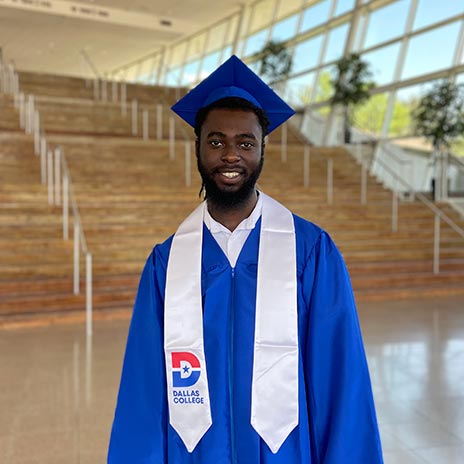
Elijah Jackson shared his story of overcoming adversity at a 2021 Dallas College graduation ceremony.
Contact: Debra Dennis; ddennis@dcccd.edu
For immediate release — Aug. 11, 2021
(DALLAS) — At age 4, Elijah Jackson knew he wanted to become a police officer.
Now 21, the recent Dallas College graduate said his goal of attaining a public service career has not waned. If anything, it’s solidified.
“I just don’t know how I got interested in police work, but it’s always been there,” said Jackson, whose career choice was shaped by his earliest memories. He says he vividly recalls two things: One was being awestruck by seeing an officer in uniform. The other is grieving his mother who died when he was only 4. These memories merged and, in doing so, helped him capture with clarity a profession he wanted to pursue.
Earlier this year, Jackson was surprised when he was tapped by a Dallas College administrator to re-tell his story to his peers during a Dallas College commencement ceremony. Shanee Moore, associate dean of student life, engagement and advocacy at Dallas College, recommended Jackson for the honor of addressing this year’s graduating class.
“There was something about him,” Moore said about Jackson, in considering him to speak at this year’s commencement. “I had this feeling that he was the one. I just couldn’t move from his name, so I gave him a call. He shared a bit about his story. I was in tears. He’s so appreciative and humble. We have remained in contact.”
Jackson explained how he became interested in law enforcement.
“An officer came to career day when I was young, and that may have influenced me, but I’m sure I wanted to be an officer way before I saw him,” Jackson said. “I told my mother and my grandmother that I was going to be a police officer. And it’s still here. I want to serve and protect.”
Jackson said the criminal justice program at Dallas College Cedar Valley Campus helped hone his passion for law enforcement.
Jackson is the youngest of five. He was raised by a single father who had to provide dual roles as his sole parent. When his mother, a nurse, died in an accident, he was deeply affected. But he was also awestruck by her friends who showed up months after her death with Christmas gifts for the entire family.
“I remember her being so kind to everyone. She had many, many friends. She would take me to her office, and I met her co-workers,” Jackson said. “After losing my mom, we went down to one salary with my dad, and we had to move out of our house. That Christmas we had no money, but my mom’s friends made sure our living room was filled with gifts. I’ll never forget that. That told me so much about who she was. She helped people, and then they helped us.”
Seizing the moment in his first public speech, Jackson told his classmates about his own adversities and asked them to applaud themselves for the trials they, too, had stared down. The class of 2021 faced a pandemic and still managed to graduate from college.
“As I look around this room, I see innovation, I see hard workers and I see leaders. I see young men and women who have overcome many of life’s challenges to achieve the opportunity to be on this stage tonight … . And believe me, it has been a challenge,” he said at the first-ever graduation for Dallas College in June.
Jackson had the benefit of Dallas Promise, which made it possible for him to attend college for free — a move that places him among a select group of high school students who are enrolled, mentored and tracked to make sure they are meeting their educational goals.
Jackson said he was shocked at being asked to speak and share his career goals.
“I want to protect and serve,” said Jackson, an armed security guard at a Dallas church. “I like to help people, and I’d like to help out the community.”
He knows the training will be long and rigorous, but he wants to be at the center of policing issues that continue to divide communities.
“With all the racial stuff going on now, that made me feel more confident in the idea of being a police officer. If there’s going to be any kind of true change, we have to change who is representing us. Becoming a police officer, as a Black man, I think that will show other people that we can do policing too and do it with fairness and understanding. It will take more people of color getting in there. Police are a necessary part of life. We need more people to choose that as a career. How else will we bring about change?”
# # #